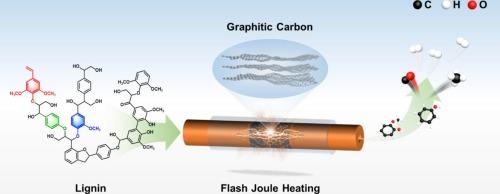Flash Joule heating-driven lignin conversion: Pyrolysis mechanisms and applications of graphitic carbon
IF 13.2
1区 工程技术
Q1 ENGINEERING, CHEMICAL
引用次数: 0
Abstract
Graphitic carbon is highly valued for its exceptional properties and wide applications; however, the efficient graphitization of lignin remains a significant challenge due to its complex structure. This study investigates the graphitization of lignin driven via flash Joule heating (FJH), providing a comprehensive analysis of the physicochemical structure of the flash graphitic carbon (LFG) and the composition of gaseous and liquid by-products under varying voltages. Additionally, the pyrolysis kinetics and mechanisms of lignin under FJH are explored. The results show that FJH efficiently converts lignin into graphitic carbon, while also generating hydrogen-rich syngas and increased yields of aromatic monomers. Furthermore, using LFG as a filler in epoxy resin significantly enhances the flexural strength and photothermal properties of the composite. This work highlights the potential of the lignin FJH process as an effective and environmentally friendly alternative to traditional methods for producing high-value carbon materials.

闪现焦耳加热驱动的木质素转化:石墨碳的热解机制和应用
石墨碳因其优异的性能和广泛的应用而受到高度重视;然而,由于木质素结构复杂,其高效石墨化仍然是一个重大挑战。本研究研究了闪焦耳加热(FJH)驱动下木质素的石墨化,全面分析了闪石墨碳(LFG)的物理化学结构以及在不同电压下气态和液态副产物的组成。此外,还探讨了木质素在FJH下的热解动力学和热解机理。结果表明,FJH能有效地将木质素转化为石墨碳,同时还能生成富氢合成气,提高芳香单体的收率。此外,在环氧树脂中使用LFG作为填料可以显著提高复合材料的抗弯强度和光热性能。这项工作强调了木质素FJH工艺作为一种有效和环保的替代传统方法生产高价值碳材料的潜力。
本文章由计算机程序翻译,如有差异,请以英文原文为准。
求助全文
约1分钟内获得全文
求助全文
来源期刊

Chemical Engineering Journal
工程技术-工程:化工
CiteScore
21.70
自引率
9.30%
发文量
6781
审稿时长
2.4 months
期刊介绍:
The Chemical Engineering Journal is an international research journal that invites contributions of original and novel fundamental research. It aims to provide an international platform for presenting original fundamental research, interpretative reviews, and discussions on new developments in chemical engineering. The journal welcomes papers that describe novel theory and its practical application, as well as those that demonstrate the transfer of techniques from other disciplines. It also welcomes reports on carefully conducted experimental work that is soundly interpreted. The main focus of the journal is on original and rigorous research results that have broad significance. The Catalysis section within the Chemical Engineering Journal focuses specifically on Experimental and Theoretical studies in the fields of heterogeneous catalysis, molecular catalysis, and biocatalysis. These studies have industrial impact on various sectors such as chemicals, energy, materials, foods, healthcare, and environmental protection.
 求助内容:
求助内容: 应助结果提醒方式:
应助结果提醒方式:


